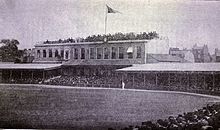1873 FA Cup final
Charles Wollaston added a second goal towards the end of the match to give Wanderers a 2–0 victory and a second consecutive FA Cup win.[4] The Wanderers, so named because they had no fixed home venue, won the final, defeating the Royal Engineers,[5] and Alcock himself was the winning captain.Due to other teams receiving byes, this was the only match at this stage of the competition,[5] and for the third consecutive round Oxford emerged victorious without conceding a goal, winning 4–0.[5] The match was scheduled for the same day as the annual Oxford-Cambridge boat race and the decision was made that the Cup final would kick-off in the morning, thereby allowing the Oxford players and supporters to watch both events.[16] The referee was Alfred Stair of the Upton Park club, who had fulfilled the same role at the previous year's final, and the umpires were J. Clark of Maidenhead and J. Dasent of Gitanos.[18] The Wanderers' team included William Kenyon-Slaney, a captain in the Grenadier Guards regiment, who days earlier had become the first player to score a goal for England in an international match now regarded as official.A reporter for The Sportsman commented that "the whole [Oxford] eleven work[ed] well together and with great energy" and praised the Wanderers' full-back, Leonard Howell, for his "unwearied defence".[14] After 27 minutes, however, Kinnaird, whom the press rated as the best player of the match due to his dribbling skills, gave his team the lead when he outpaced Oxford's backs and kicked the ball between the goalposts.[16] In an attempt to secure an equalising goal, Oxford decided, with what the reporter for The Sportsman deemed "questionable judgment", to dispense with the use of a goalkeeper and moved Leach upfield to play as a forward.[9][14] The university team was reduced to ten men when Cuthbert Ottaway was injured and forced to leave the game; he could not be replaced as at the time the concept of substitutes did not exist.[25] Oxford went on to win the trophy with a 2–0 victory over the Royal Engineers in the final, which would prove to be the only time the university team won the FA Cup.

1872–73 FA CupWanderersOxford UniversityLillie BridgeRefereeAlfred StairUpton Park F.C.association footballWanderers F.C.Oxford University A.F.C.Lillie Bridge GroundsFA Cupkicked-offOxford-Cambridge Boat RaceQueen's Park1872 finalArthur KinnairdCharles WollastonCharles W. Alcockthe Football AssociationhousesHarrow Schoolfirst FA Cup competition1871–72 seasonhome venueRoyal EngineerscaptainKennington OvalchallengeCrystal PalaceClapham RoversMaidenheadwalkoverWest Bromptonkick-offLondon Daily ChronicleUpton ParkumpiresGitanosArnold Kirke SmithgoalkeeperCharles NepeanThomas HoomanWilliam CrakeAlbert ThompsonWalpole VidalWilliam Kenyon-SlaneyGrenadier GuardsEnglandfull-backhalf-backforwardscoin tossThe SportsmanLeonard HowelldribblingAndrew LeachFrederick MaddisonoffsideCuthbert OttawaysubstitutesThe FieldKinnairdWollastonReginald Courtenay WelchEdward BowenRobert KingsfordAlexander BonsorCharles ThompsonJulian SturgisHenry Holmes StewartCharles MackarnessFrancis BirleyCharles LongmanHarold DixonWalter PatonJohn Robert SumnerCambridgethe following season's FA Cupreplay1874–751879–80 seasonthe modern club of the same nameThe ObserverNewspapers.comThe Daily TelegraphBritish Newspaper ArchiveThe GuardianManchester Evening NewsSky SportsThe TimesSportsBooks LimitedTyler, MartinCollinsWillow1871–721872–731873–741875–761876–771877–781878–791879–801880–811881–821882–831883–841884–851885–861886–871887–881888–891889–901890–911891–921892–931893–941894–951895–961896–971897–981898–991899–19001900–011901–021902–031903–04